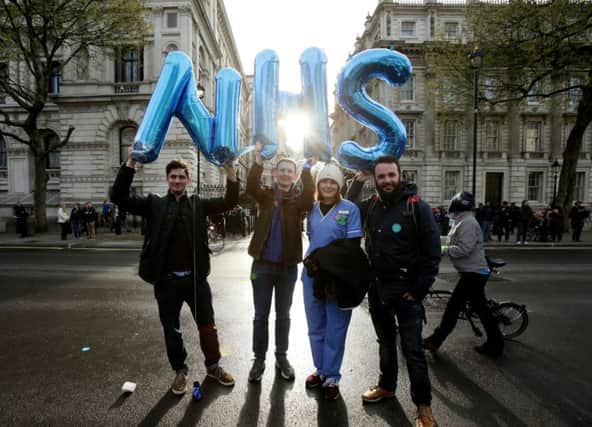Striking junior doctors could now face competence tests


Prolonged industrial action could lead to a “loss of training experience”, according to the body which oversees education and training within the health workforce in England.
Health Education England (HEE) has said that if any trainee misses out on more than two weeks of training - or work days - then they could be red-flagged by the General Medical Council (GMC). This could lead to an assessment of their training progression, HEE said.
Advertisement
Hide AdAdvertisement
Hide AdThe rolling action - the first of its kind in the history of the NHS - will see junior medics withdraw labour, including emergency care, for a week each month until the end of the year.
Medics will stage strikes from September 12 to 16, on October 5, 6, 7, 10 and 11, November 14 to 18 and December 5 to 9, withdrawing from labour between the hours of 8am and 5pm, in the ongoing dispute over a controversial new contract.
But in advice for doctors considering industrial action, HEE said: “Whilst industrial action in the short term may not necessarily compromise their training, there could be circumstances where prolonged industrial action and loss of training experience impact on a doctor’s ability to demonstrate competence and the satisfactory completion of the curriculum.
“To manage this issue, HEE will comply with GMC guidance that states if a trainee misses more than two weeks (when a trainee would normally be at work), over and above annual leave, that the satisfactory training progression of a trainee should be reviewed at their next Annual Review of Competence Progression.”
Advertisement
Hide AdAdvertisement
Hide AdFor a junior doctor who has chosen their specialty, it is flagged if they miss 14 days or more above annual leave. For those in their first two years of training, it is flagged if trainees miss 20 days or more.
The news comes as the GMC also issued guidance to those considering taking industrial action.
The medical regulator said patients “will suffer” as a result of the impending strike as it urged junior doctors to seriously consider whether or not to take part in the action.
The Government and British Medical Association (BMA) remain at loggerheads over the contract, which the Department of Health says will help to provide a seven-day NHS.
Advertisement
Hide AdAdvertisement
Hide AdThe GMC guidance states: “Given the scale and repeated nature of what is proposed, we believe that, despite everyone’s best efforts, patients will suffer.
“In light of this, the right option may be not to take action that results in the withdrawal of services for patients.”
It also reiterated doctors’ professional duties to “put their patients first and protect them from harm”.
Meanwhile, HEE said it is looking at a “wide range of initiatives” to try to tackle concerns that have been raised by junior doctors.
Advertisement
Hide AdAdvertisement
Hide AdHEE medical director Professor Wendy Reid said: “Doctors in training are a vital part of the NHS family, playing a key role in the delivery of much-needed healthcare to patients up and down the country. The anger and disillusionment shown during the recent dispute has drawn into sharp focus the need for a new approach to make sure that they feel valued and able to work in supportive and accountable environments.”
Six strikes have already taken place across England during the lengthy dispute, causing disruption to hundreds of thousands of patients who have had appointments and operations cancelled.
In May it looked as though a breakthrough had been reached in the dispute after both sides agreed to a new deal.
Then in July, the Government announced that it would impose a new contract after junior doctors and medical students voted to reject the contract brokered between health leaders and the BMA.
Advertisement
Hide AdAdvertisement
Hide AdThe BMA said it will call off the strikes if the Government agrees to stop the imposition.
A BMA spokesman said: “Patient safety remains doctors’ priority and, since the announcement last week of further action, the BMA has been liaising with NHS leaders so that plans can be put in place swiftly to minimise disruption for patients.
“This action is still avoidable. The BMA has said it will call off next week’s action if the Government puts a halt to plans to force junior doctors to work under a contract they have rejected because they don’t believe it is good for the future of patient care or the profession.”
A Department of Health spokeswoman said: “As doctors’ representatives, the BMA should be putting patients first not playing politics in a way that will be immensely damaging for vulnerable patients.
Advertisement
Hide AdAdvertisement
Hide Ad“What’s more, the BMA must be the first union in history to call for strike action against a deal they themselves negotiated and said was a good one.
“Whilst there are many pressures on the front line, funding is at record levels, with the highest number of doctors employed in the history of the NHS. Co-operation not confrontation is the way forward to make sure patients get the best treatment and the NHS is there for people whenever they need it.”